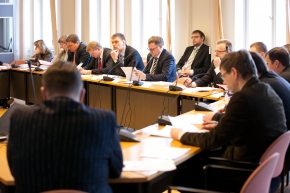 Gallery
Gallery
On Tuesday, 5 July, the Economic, Agricultural, Environmental and Regional Policy Committee of the Saeima approved the amendments to the Law on Regulators of Public Utilities, which are aimed at strengthening the independence of the Public Utilities Commission (PUC) in compliance with the European Union requirements. The Saeima will now consider the relevant draft law in the third reading.
It is planned to stipulate in the law that the PUC shall be an institutionally and functionally independent, full-fledged and autonomous legal entity subject to public law and that it shall also be independent in terms of executing its own budget. According to the current wording of the law, the PUC is a derivative public entity under the supervision of the Minister for Economics.
The Committee in charge of advancing the draft law supported a provision according to which tariffs are set at a level that covers economically justified costs and ensures profitability of utility services in conformity with the terms and conditions of licence unless specialised sectoral laws provide otherwise. As the factors affecting tariffs change, the PUC may request a review of tariffs and justification of costs.
It is also planned to stipulate that the PUC will no longer act as a mandatory preliminary extrajudicial institution; that means that the disputing parties will be free to choose the dispute resolution institution that they regard as the most effective, i.e., either the regulator or a court of general jurisdiction.
The draft law also prescribes the procedure for dispute resolution in case a disputing party is not satisfied with the regulator’s decision. Parties will have the right to appeal such decisions in accordance with the procedure set forth in the Administrative Procedure Law. In order to have the case adjudicated on its merits, parties will be entitled to turn to a court in accordance with the procedure set forth in the Civil Procedure Law. Ongoing disputes will be resolved in accordance with the current procedure, but as soon as the relevant amendments to the Civil Procedure Law are endorsed, the new procedure will be applied.
Provisions that prescribed establishing a municipal advisory institution will be deleted from the law. Authors of the draft law report that this will be done because the Latvian Association of Local and Regional Governments issued its opinion that such an institution is unnecessary. In order to identify interests and opinions of the local governments, the PUC has established regional structures that ensure cooperation between the regulator and the planning regions.
The draft law also regulates the procedure for calculating the state fee for merchants that begin providing public utilities. It also sets forth the procedure for paying the state fee in cases in which an enterprise has paid either an insufficient or excessive state fee.
The legislative proposals also reduce the costs incurred by the PUC and providers of public utilities because hereafter they will be able to opt out of publishing announcements in the official newspaper Latvijas Vēstnesis.
It is also planned to exempt the PUC from supervising energy supply facilities and hydrotechnical structures as of 1 July 2012.
Saeima Press Service







